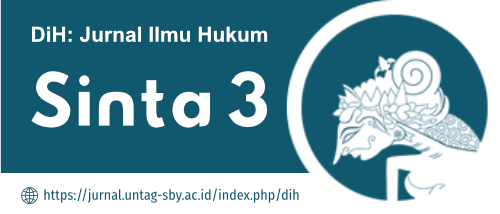North Natuna Sea Naming After South China Sea From The International Law Perspective
DOI:
https://doi.org/10.30996/dih.v0i0.6998Abstract
Tujuan penelitian ini adalah untuk mengkaji alasan dasar Pemerintah Indonesia melakukan penamaan Laut Zona Ekonomi Ekslusif di utara Natuna menjadi Laut Natuna Utara dimana posisinya bersinggungan dengan Laut China Selatan serta mempertimbangkan dampak yang akan terjadi setelah penamaan tersebut. Penelitian ini termasuk penelitian normatif dengan pendekatan Undang-Undang di mana berbagai literatur yang terkait sebagai data sekunder yang akan memperkuat argumentasi penelitian. Usulan toponimi ini mendapat penolakan dari China karena akan merugikan kawasan Laut China Selatan yang secara historis diakui oleh China melalui sembilan garis putus-putus padahal langkah pemerintah Indonesia adalah untuk memberikan nama laut di Utara Natuna menjadi Laut Natuna Utara. Hasil penelitian ditemukan bahwa penamaan atau toponimi oleh Pemerintah Indonesia sudah mematuhi Hukum Internasional sebagai penegasan identitas kawasan laut Indonesia dalam hal ini UNCLOS 1982 sebagai Konstitusi Kelautan Dunia dan tidak memiliki dampak yang signifikan bagi Indonesia karena Pemerintah Indonesia sudah melangkah sesuai Pasal 55 UNCLOS dan S-23 International Hydrographic Organization (IHO).
Kata Kunci : zona ekonomi ekslusif Indonesia. penamaan wilayah laut, laut china selatan,
Abstract
The purpose of this study is to examine the basic reasons for the Government of Indonesia to name the Exclusive Economic Zone Sea north of Natuna into the North Natuna Sea where it intersects with the South China Sea and consider the impact that will occur after the naming. This research includes normative research with an Act approach where various literature is related as secondary data that will strengthen the research arguments. This toponymy proposal has been rejected by China because it would harm the South China Sea region which has historically been recognized by China through nine dotted lines even though the Indonesian Government's move was to name the sea north of Natuna into the North Natuna Sea. The results of the study found that the naming or toponymy by the government of Indonesia has complied with International Law as an affirmation of the identity of Indonesia's sea area in this case UNCLOS 1982 as the World Marine Constitution and has no significant impact on Indonesia because the Government of Indonesia has stepped up in accordance with Article 55 of UNCLOS and S-23 of the International Hydrographic Organization (IHO).
Keywords: Indonesia’s exclusive economic zone, naming of the sea area, south china sea.
Downloads
References
Anggito, Albi., Setiawan, Johan. 2018. Metodologi Penelitian Kualitatif. Sukabumi, Jawa Barat. CV Jejak.
Cahyono, Arie. 2019. Menciptakan Sebuah Kekuatan Komunikasi Efektif. Jawa Timur. Uwais Inspirasi Indonesia.
Fatta, Hanif. 2007. Analisis dan Perancangan Sistem Informasi (untuk Keunggulan Bersaing Perusahaan dan Organisasi Modern). Yogyakarta. CV Andi Offset.
Ginting, Desmon. 2017. Komunikasi Cerdas (Panduan Komunikasi di Dunia Kerja). Jakarta. PT Elex Media Komputindo.
Hermawan, Asep., Yusran, Husna. 2017. Penelitian Bisnis Pendekatan Kualitatif. Depok. Kencana.
Liliweri, Alo. 2011. Komunikasi Serba Ada Serba Makna. Jakarta. Kencana.
Muhardeni, Riza. 2018. Peran Intensitas Komunikasi, Kepercayaan, dan Dukungan Sosial Terhadap Kebahagiaan Perkawinan Pada Istri Tentara Saat Menjalani Long Distance Marriage (LDM) di Batalyon Infanteri 407/ Padmakusuma Kabupaten Tegal. Vol 16, No 1, 34 – 44. Jurnal Psikologi Sosial. Universitas Indonesia.
Ni’matuzahroh., Prasetyaningrum, Susanti. 2018. Observasi : Teori dan Aplikasi dalam psikologi. Malang. Universitas Muhammadiyah Malang.
Muhaimin, Ramdhan. 2018. ‘KEBIJAKAN SEKURITISASI DAN PERSEPSI ANCAMAN DI LAUT NATUNA UTARA [THE POLICY OF SECURITIZATION AND THREAT PERCEPTION IN NORTH NATUNA SEA]’, Jurnal Politica Dinamika Masalah Politik Dalam Negeri Dan Hubungan Internasional, 9.1: 17–38
Mukti Fajar, N D, and Yulianto Achmad. 2019. ‘Dualisme Penelitian Hukum Normatif Dan Empiris, Cetakan Kelima’ (Yogyakarta: Pustaka Pelajar)
Noor, Muhammad. 2020. ‘Natuna Dan Strategi Poros Maritim Dunia’, DetikNews
Osseweijer, Manon. 2006. ‘The Future Lies in the Sea’, in Muddied Waters (BRILL), pp. 163–83 <https://doi.org/10.1163/9789004454347_009>
Pratomo, Harwanto Bimo. 2017. ‘Pemerintah Ganti Nama Laut China Selatan Jadi Laut Natuna Utara’, Merdeka.Com
Pusat Penelitian Politik. 2017. ‘Laut Natuna Utara Dan Respon Tiongkok’, Pusat Penelitian Politik
Rachma, T R N, Turmudi, and P Kardono. 2021. ‘Application of GIS to Define a Juridical Bay as Part of Indonesia’s Internal Waters’, IOP Conference Series: Earth and Environmental Science, 739.1: 012093 <https://doi.org/10.1088/1755-1315/739/1/012093>
S.M. Noor. 2012. ‘Wilayah Negara’, Negara Hukum
Sambogo, Alief. 2018. ‘Penamaan Laut Natuna Utara Oleh Pemerintah Indonesia Dalam Prespektif Hukum Internasional’, Jurist-Diction, 1.2: 381–96
———. 2019. ‘PENAMAAN LAUT NATUNA UTARA OLEH PEMERINTAH INDONESIA DALAM PRESPEKTIF HUKUM INTERNASIONAL’, Jurist-Diction, 1.2: 381 <https://doi.org/10.20473/jd.v1i2.10787>
Santosa, Teguh. 2020. ‘Penamaan Laut Natuna Utara Sudah Tepat Dan Strategis’, Investor.Id
Subagyo, P. Joko. 2009. Hukum Laut Indonesia (Jakarta: Rineka Cipta)
Universitas Indonesia. 2018. ‘Peran Indonesia Sebagai Negara Kepulauan Terbesar Di Dunia’, Universitas Indonesia
Yee, Andy. 2011. ‘Maritime Territorial Disputes in East Asia: A Comparative Analysis of the South China Sea and the East China Sea’, Journal of Current Chinese Affairs, 40.2: 165–93 <https://doi.org/10.1177/186810261104000207>
Downloads
Published
Issue
Section
License
Authors who publish with DiH: Jurnal Ilmu Hukum agree to the following terms:
- Authors transfer the copyright and grant the journal right of first publication with the work simultaneously licensed under a CC BY-SA 4.0 that allows others to share the work with an acknowledgement of the work's authorship and initial publication in this journal.
- Authors are able to enter into separate, additional contractual arrangements for the non-exclusive distribution of the journal's published version of the work (e.g., post it to an institutional repository or publish it in a book), with an acknowledgement of its initial publication in this journal.
- Authors are permitted and encouraged to post their work online (e.g., in institutional repositories or on their website) prior to and during the submission process, as it can lead to productive exchanges, as well as earlier and greater citation of published work (See The Effect of Open Access)










